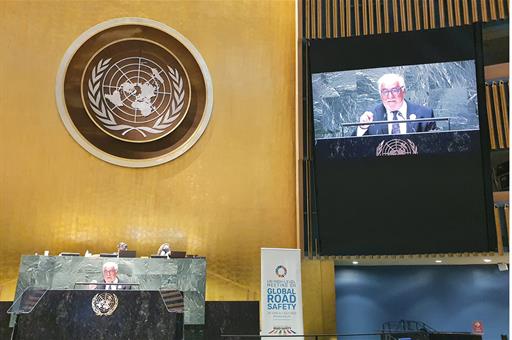A Spanish delegation, headed by the Director General of Traffic, Pere Navarro, and the President of the Road Safety Commission of the Lower House of Parliament, Juan José Matarí, is currently in New York taking part in the United Nations General Assembly to present Spain's road safety policy.
Navarro spoke yesterday, Thursday, at the Plenary Session on behalf of the Government of Spain to present the main lines of Spain's road safety policy with a 2030 horizon. In his presentation, the Director General of Traffic highlighted the recent approval of the National Road Safety Strategy 2030, aligned with the objective of the Second Decade of Action of the United Nations to reduce by 50% the number of deaths and serious injuries caused by road accidents in this decade.
It is a strategy that prioritises safety above all other considerations in traffic management and links road safety with sustainable mobility because one is not possible without the other. The strategy also envisages that traffic enforcement is the best way to reduce accidents and casualties, making traffic police, the use of new technologies for surveillance, control of traffic law and the management of sanctions, basic and fundamental parts of road safety policy.
Vulnerable users
Navarro reviewed other key points of the 2030 Strategy, which focuses on speed as a risk factor, prioritises the protection of vulnerable users, makes a firm commitment to the connected vehicle and sets as an objective in the field of Road Safety Education that all young people leaving the education system should be trained in the values of road safety and how to be safe pedestrians and bicycle users.
He also alluded to the implementation of 30km/h on one-way streets in Spanish cities from a year ago. This measure is helping to calm traffic, encourage coexistence between the different modes of transport that share the road and, in short, make mobility safer and more sustainable.
Last, he stressed that this strategy places victims at the centre of road safety policy, giving them a voice and accompanying them after the accident, and complies with the ethical and moral obligation to share positive experiences with other countries, something which, in the case of Spain, is being done intensively with both Latin American and Maghreb countries.
An example of this is the working meetings held with delegations from Armenia, Chile, El Salvador, Mauritania, Paraguay and the Dominican Republic.
State consensus
Juan José Matarí, Chairman of the Road Safety Commission of the Spanish Congress, will speak on Friday. Matarí is invited by the Presidency of the United Nations General Assembly to attend a panel on political leadership, the integration of road safety policy into sustainable development policies and the integrated approach of governments and administrations.
In his speech, Matarí will emphasise the need to consider road safety as a state problem, with a long-term vision and a predisposition for consensus, as has been done in Spain thanks to the Road Safety Commission of the Lower House of Parliament which, in addition to monitoring government action, serves as a meeting and collaboration point where civil society also comes together.
The Spanish representative will give an account of the evolution in the reduction of the accident rate on Spanish roads over the last 20 years, thanks to initiatives and activities such as the introduction of the Points Licence, the various reforms of the Traffic and Road Safety Law, the reform of the Criminal Code for traffic offences and the creation of a special Public Prosecutor's Office for road safety.
A resolution will also be adopted at this meeting, which will include concrete measures for action to improve road safety.
These events are taking place because, following the resolution proclaiming the Second Decade of Action, a resolution was passed calling for a high-level meeting and a plenary session at which all UN member states would have the opportunity to present their road safety policies.
Non official translation





